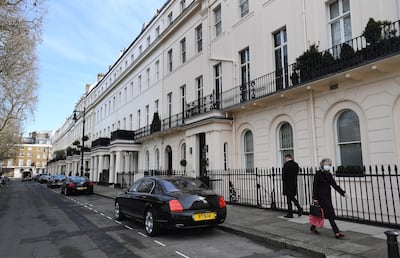Rental values for prime property in London have risen by about a quarter since the start of the pandemic — but demand is slowing, latest research shows.
Supply dwindled as demand surged, leaving tenants struggling to find properties, according to Knight Frank.
Its report said the market had calmed down after the rise in activity, over the past 18 months in particular.
The news came after the boss of Foxtons, one of the UK's largest estate agent groups, this month said renters in London may be forced to move further out of the capital and make significant adjustments to their lifestyles due to the shortage in supply.
That warning followed a report from property advisory firm JLL, which found "consistent declines in available rental homes and a lettings frenzy" had driven record rental growth last year.
The Knight Frank research showed in the three years since the pandemic struck, rental values in prime central London have risen by 27 per cent.
Rents for prime property in outer London have risen by 23 per cent.
But this month, annual rental value growth stood at 16.9 per cent in prime central London and 15.2 per cent in prime outer London, the lowest figures since November 2021.
Another indicator, market valuation appraisals, which measure the strength of supply, was 11 per cent higher than the five-year average for properties valued at less than £1,000 ($1,233) a week in February.
Between £1,000 and £5,000 per week, there was a 132 per cent increase.
“Although the numbers compare to 25 per cent-plus this time last year, they are still high by historical standards,” said Tom Bill, head of UK residential research at Knight Frank.
He said lettings supply has not risen to the extent some expected since Christmas.
“It has produced fewer so-called accidental landlords, or owners who decide to let out their property after failing to achieve their asking price,” said Mr Bill.
“New listings in London in February were down by around a third versus the five-year average, Rightmove data shows.
“For higher-value properties, lettings supply is less scarce because owners are typically more discretionary about their options and more have chosen the rental route in recent months due to the economic turbulence.”

Mr Bill predicts as the general election approaches, the growing cost-of-living pressures faced by tenants will come under renewed focus.
Tenants finances are already being squeezed across the UK, reflected in recent figures from the ONS showing rents rose last month by the most since records began in 2016.
Mr Bill said the problem has been aggravated by landlords leaving the sector in recent years due to a series of tax and legislative changes.
He added: “Landlords have been targeted for political capital, but lower supply mean tenants have also suffered.
“More institutional capital is flowing into the rental sector but build-to-rent still only accounts for less than 2 per cent of stock so it doesn’t make a material difference to how rents move.
“The bad news for tenants is that politics rather than economics will be in the ascendancy as the election countdown begins.”


